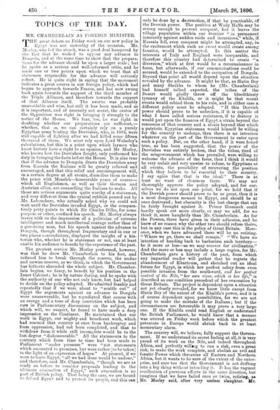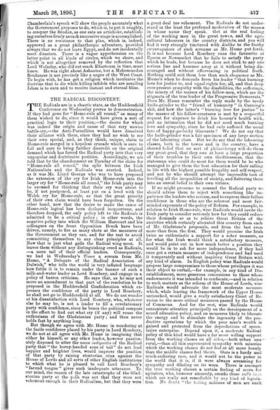TOPICS OF TILE DAY.
MR. CHAMBERLAIN AS FOREIGN MINISTER.
great debate on Friday week on our new policy in Egypt was not unworthy of the occasion. Mr. Morley, who led the attack, was a good deal hampered by the fact that he wished to oppose any advance to Dongola., and at the same time to show that the prepara- tions for the advance should be upon a larger scale ; but he spoke as a serious and well-informed critic, and, be made one or two points upon which we trust that all statesmen responsible for the advance will seriously reflect. He is quite right in saying that the movement indicates a great swerve in our foreign policy, which had begun to approach towards France, and has now swung back again towards the support of the third member of the Triple Alliance, and therefore towards the support of that Alliance itself. The swerve was probably unavoidable and wise, but still it has been made, and as it is important, and of necessity not secret, the orator of the Opposition was right in bringing it strongly to the notice of the House. We fear, too, lie was right in doubting whether our preparations are sufficient,— whether, that is, we can certainly rely on a purely Egyptian army beating the Dervishes, who, in 1884, were still capable of fighting after we had killed some fifteen thousand of them. We must rely upon Lord Wolseley's calculations, but this is a point upon which laymen who know history have a right to an opinion, and Mr. Morley, who knows how the Dervishes fought, only performed his duty in bringing the facts before the House. It is also true that if the advance to Dongola draws the Dervishes away from Kassala the Italians will be greatly relieved and encouraged, and that this relief and encouragement will, in a certain degree at all events, disincline them to make the peace with Menelek—honourable peace of course— which all Englishmen, as well as their German and Austrian allies, are counselling the Italians to make. All those are serious arguments quite worthy of a statesman, and very different from the cynical rubbish poured out by Mr. Labouchere, who actually asked why we could not wait until the Dervishes invaded Egypt, or the compara- tively petty points to which Sir Charles Dilke, for some purpose or other, confined his speech. Mr. Morley always leaves with us the impression of a politician of extreme intelligence and much intellectual courage rather than of a governing man, but his speech against the advance to Dongola, though throughout fragmentary and in one or two places contradictory, displayed the insight of a his- torian who, whether he is statesman or not, can at least enable his audience to benefit by the experience of the past. The greatest service Mr. Morley performed, however, was that he drew Mr. Chamberlain to his feet, and induced him to break through the reserve, the undue and unwise reserve, as we think, in which the Government has hitherto shrouded the whole subject. Mr. Chamber- lain begins, we fancy, to benefit by his position in the Inner Cabinet ; he is by nature daring, and he spoke with the authority of one who not only knew, but had helped to decide on the policy adopted. He admitted frankly and repeatedly that if we were about to "scuttle out" of Egypt the arguments against an advance to Dongola were unanswerable, but he repudiated that course with an energy and a tone of deep conviction which has been rare in Parliamentary discussions on the subject, and which will, we suspect, be found to have made a deep impression on the Continent. He maintained that our work in Egypt, our mighty and beneficent work, which had rescued that country at once from bankruptcy and from oppression, had not been completed, and that to withdraw from it while still incomplete would be to the last degree "dishonourable." All the statements to the contrary which from time to time had been made in Parliament "under pressure" were "not statements which amounted to promises, but were rather [to be taken] in the light of an expression of hopes." At present, if we were to leave Egypt, "all we had done would be undone," and therefore, said Mr. Chamberlain, "though we are as ready as before to consider proposals leading to the ultimate evacuation of Egypt," such evacuation is no part of British policy. That being the ease, we are bound to defend Egypt and to protect its people, and this can only be done by a destruction, if that be practicable, of the Dervish power. The position at Wady Haifa may be strong enough to prevent conquest, but it leaves the village population within our frontier "in permanent insecurity against sudden raids and incursions," while, if Kassala fell, even conquest might be attempted, nay, in the excitement which such an event would create among fanatics, would be attempted. In this matter the. interests of Italy and England were inseparable, and therefore this country bad determined to create "a diversion," which at first would be a reconnaissance in force, but afterwards, if our communications could be secured, would be extended to the occupation of Don gola. Beyond that point all would depend upon the situation- revealed by the advance. It might be that, as Slatin Bey and many Sheikhs to whom he (Mr. Chamberlain) had himself talked expected, the tribes of the- Desert would gladly throw off the bloodthirsty tyranny of the Khalifa, or it might be that recent events would rebind them to his rule, and in either case a. different policy must be adopted. "If this Dervish power should prove to be unbroken, if it is capable of what I have called serious resistance, if to destroy it. would put upon the finances of Egypt a strain beyond the- resources of that country and a strain beyond that which a patriotic Egyptian statesman would himself be willing for the country to undergo, then there is no intention whatever on the part of the Government to enter upon such a policy. But, on the other hand, if it were found true, as has been suggested, that the power of the Dervishes was entirely broken, that the tribes, tired of the misgovernment which has prevailed, were willing to welcome the advance of the force, then I think it would be very unfair and very unwise to refuse, to Egyptians at. all events, the possibility of recovering the position which they believe to be essential to their security. I say again that that is the ideal." There is at- least no want of clearness there. We may not thoroughly approve the policy adopted, and for our- selves we do not upon one point, for we hold that if the Dervish power should prove to be so great, then it is a most dangerous menace to Egypt, and should be at once destroyed ; but obscurity is the last charge that can be fairly brought against it. Prince Bismarck could hardly speak out more clearly, or may we add, for we think it, more haughtily than Mr. Chamberlain. As for the Powers, three have given in their adhesion, and he knew of no reason why the other two should refuse theirs,. but in any case this is the policy of Great Britain. More- over, when we have advanced there will be no retiring_ "Where we go, there we shall remain." " We have no- intention of handing back to barbarism such territory-.-- be it more or less—as we may recover for civilisation." And the more or less may include a large region, for Mr_ Chamberlain gave a history of the past, from which any impartial reader will gather that he regrets the abandonment of Khartoum, and sketched out an ideal future for Egypt, in which her perfect safety from even possible invasion from the southward, and her perfect control of the Nile," her own river, which is her life," is described as one condition precedent of her evacuation by Great Britain. The project is dependent upon a situation not yet clearly revealed, for we know little except from Slatin Bey of the extent of the Khalifa's power, and it is of course dependent upon possibilities, for we are not going to make the mistake of the Italians ; but if the circumstances are favourable it may prove a very large one. If the Khalif& could read English or understand the British Parliament, he would know that a menace was uttered on Friday week before which the greatest potentate in Europe would shrink back in at least momentary alarm.
The country will, we believe, fully support the Govern- ment. If we understand its secret feeling at all, it is very proud of its work on the Nile, and indeed throughout Africa, and perfectly willing to run a risk, even a great risk, to make the work complete, and abolish an evil and. fanatic Power which threatens all Eastern and Northern Africa, but it wants to be sure of the extent of the enter- prise, and sure too that the Government is not drifting into a big thing without intending it. It has the vaguest recollection of previous efforts in the same direction, but imagines that we have failed once or twice, retiring, as Mr. Morley said, after very useless slaughter. Mr. Chamberlain's speech will show the people accurately what the Government proposes to do, which is, to put it roughly, to conquer the Soudan, as one eats an artichoke, establish- ing ourselves firmly as each successive stage is accomplished. There is no resistance to that plan, which is, indeed, approved as a great philanthropic adventure, provided always that we do not leave Egypt, and de not incidentally meet disasters. There is a vague apprehension on the latter point in all kinds of circles, which we share, and which is not altogether removed by the reflection that Lord Wolseley, who did not reach Khartoum in time, must know. He was right about Ashantee, but a Mahommedan Soudanese is not precisely like a negro of the West Coast. To begin with, he has got a religion which inculcates the doctrine that to die while killing infidels who are assailing Islam is to earn and to receive instant and eternal bliss.







































 Previous page
Previous page